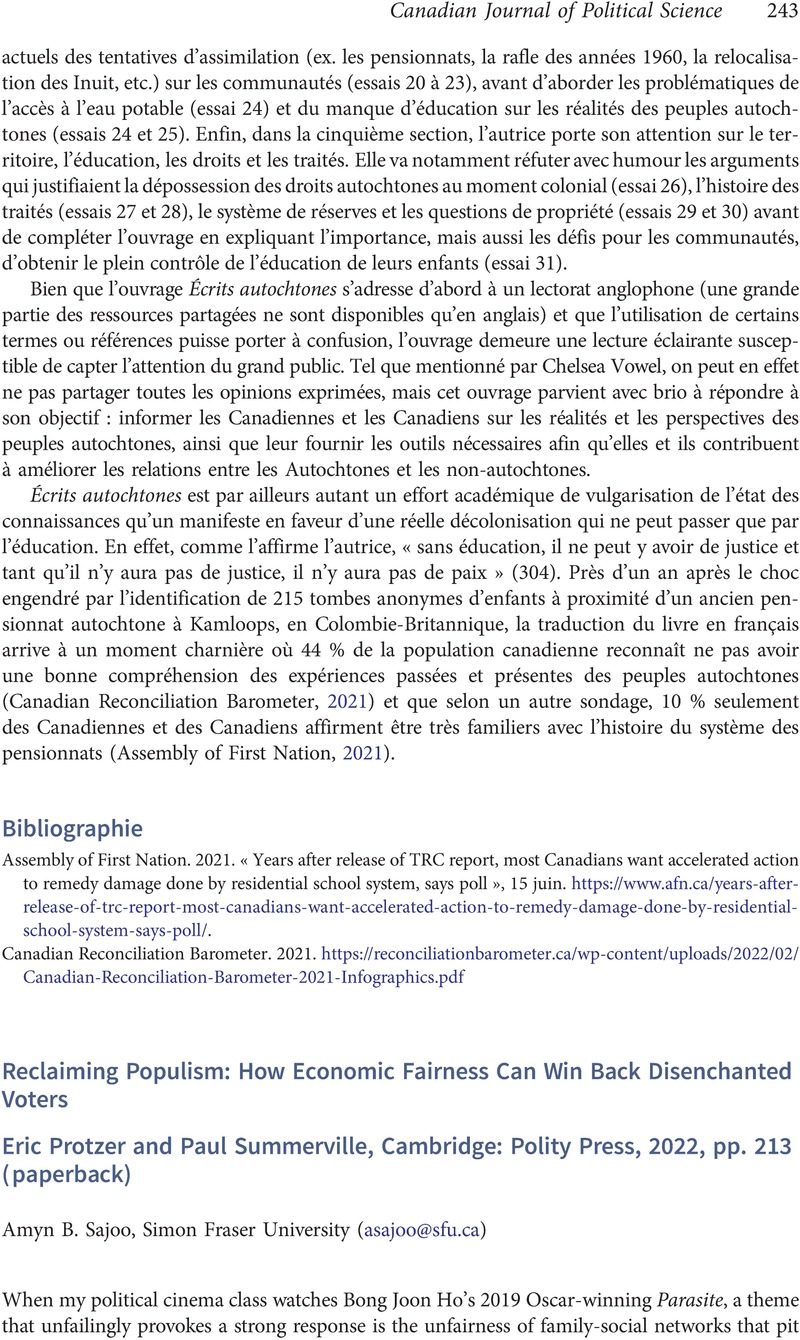When my political cinema class watches Bong Joon Ho's 2019 Oscar-winning Parasite, a theme that unfailingly provokes a strong response is the unfairness of family-social networks that pit South Korea's “dirt spoons” against “gold spoons” (Chen, Reference Chen2019). While suitably troubled by the country's Gini coefficient (over 68 per cent, according to the World Bank), the class appears more upset by the “fated” misery of Parasite's Kim family, as they toil for and manipulate the privileged Park household. Poor social mobility is felt to be worse than inequality. This is the key to what drives global populism according to Paul Summerville (University of Victoria) and Eric Protzer (Harvard's Growth Lab).
As the authors note in their preface, the working title for Reclaiming Populism was Defeating Populism. Indeed, the opening chapter offers a survey of mainstream theories about “populist eruptions” as a threat to liberal democracy, beyond the headlines on Brexit, Trump and Marine Le Pen. As an “anti-pluralist politics” resulting mainly from economic inequality that supposedly benefits elites, populism is hardly welcome. But what if the culprit is “public policy regimes that leave citizens vulnerable to economic unfairness”—which is “wholly unrelated to prescriptions like deporting immigrants, regulating online speech, soaking the rich, or shutting down international trade?” (37). For Summerville and Protzer, hard evidence from economies that underwent deep shocks ties populism not to their magnitude but to “whether those outcomes [notably job losses] are fairly deserved.” Trade shocks, such as from the upsurge in imports from China, do matter; but it's the policy response and ensuing vulnerability of the economy that underlies populist trends.
In their defence of reclaiming populism, the authors unpack the ethics of fairness as a primary value (ahead of equality) and the ways in which this can be advanced in national public policy in Western liberal settings. They do so succinctly, with quantitative as well as qualitative arguments that build on Rawlsian distributive justice precepts. Fairness not only “entails equal opportunity” but also resisting “enforced equal outcomes” (52–53). Neoliberalism's myopic view of the market fails to deliver this; solidarity with the disadvantaged smooths the quest for just deserts (55–56). The United States has among the world's highest per capita GDP levels and growth rates, along with dynamic innovation. But it also has among the lowest social mobility rates in the developed world, and it had the second highest poverty rate in the OECD in 2017—which, say the authors, “strongly contributed to the Trump phenomenon and all the disruption it has created” (144). A similar linkage is found in France, as well as in other West European countries that have experienced populist drives.
However, to claim that economic unfairness is the primary explanator, regardless of local histories, is less tenable. Whose perceptions count when ostensibly democratic polities favour particular types of privilege and influence? In settler states—including Australia and Canada, Chile, Israel and the United States—economic fairness for Indigenous peoples has ranked nowhere; yet opposition to remedial policies on resource rights figures in populist campaigns. Can economic fairness chiefly explain why populist forces prevail in Quebec on issues of religious symbols and sovereignty? Is Islamophobia to be dismissed as mere scapegoating when it is systemic and involves elites and mass publics (Lean, Reference Lean2017; Sajoo, Reference Sajoo2020; Zine, Reference Zine2022)? Subversion of democratic checks and balances, as well as of minority rights, is endemic to populism, not incidental (Waldron, Reference Waldron and L2020; Arato and Cohen, Reference Arato and Cohen2021).
Globally, economic inequality in Brazil, South Africa and India puts their vast sectors of the most impoverished at the bottom of the world's poorest, displacing China's now better-off poorest (Milanovic, Reference Milanovic2022). All three countries have been in the headlines on populism, driven by political and economic factors—from religious nationalism and apartheid's legacy to anti-establishment militancy. Ideological perceptions about just deserts (Hindutva, resistance to COVID-19 and environmental measures, anti-Indigenous sentiment) frame the discourse on equal citizenship. Much the same is true of Recep Erdoğan's Turkey (Temelkuran, Reference Temelkuran2019). When the ethics of fair play in the real world are largely on the side of populism's targets rather than the perpetrators, it's hard to envisage a reclaiming that still serves the tenets of both constitutional and human-rights accountability.
This study will appeal to a broad academic audience, with its readily accessible take on political and economic theory and its use of narratives to keep the discussion engaging throughout. While the focus on developed countries may somewhat limit the appeal when populism has gone global, it does make for a shorter and tighter text.





